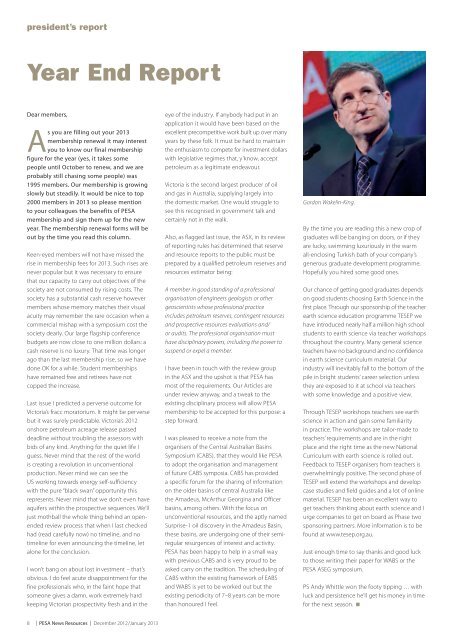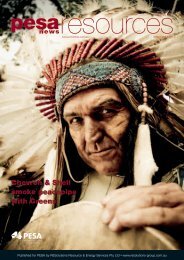Download - Pnronline.com.au
Download - Pnronline.com.au
Download - Pnronline.com.au
Create successful ePaper yourself
Turn your PDF publications into a flip-book with our unique Google optimized e-Paper software.
president’s report<br />
Year End Report<br />
Dear members,<br />
As you are filling out your 2013<br />
membership renewal it may interest<br />
you to know our final membership<br />
figure for the year (yes, it takes some<br />
people until October to renew, and we are<br />
probably still chasing some people) was<br />
1995 members. Our membership is growing<br />
slowly but steadily. It would be nice to top<br />
2000 members in 2013 so please mention<br />
to your colleagues the benefits of PESA<br />
membership and sign them up for the new<br />
year. The membership renewal forms will be<br />
out by the time you read this column.<br />
Keen-eyed members will not have missed the<br />
rise in membership fees for 2013. Such rises are<br />
never popular but it was necessar y to ensure<br />
that our capacity to carry out objectives of the<br />
society are not consumed by rising costs. The<br />
society has a substantial cash reserve however<br />
members whose memory matches their visual<br />
acuity may remember the rare occasion when a<br />
<strong>com</strong>mercial mishap with a symposium cost the<br />
society dearly. Our large flagship conference<br />
budgets are now close to one million dollars: a<br />
cash reserve is no luxury. That time was longer<br />
ago than the last membership rise, so we have<br />
done OK for a while. Student memberships<br />
have remained free and retirees have not<br />
copped the increase.<br />
Last issue I predicted a perverse out<strong>com</strong>e for<br />
Victoria’s fracc moratorium. It might be perverse<br />
but it was surely predictable. Victoria’s 2012<br />
onshore petroleum acreage release passed<br />
deadline without troubling the assessors with<br />
bids of any kind. Anything for the quiet life I<br />
guess. Never mind that the rest of the world<br />
is creating a revolution in unconventional<br />
production. Never mind we can see the<br />
US working towards energy self-sufficiency<br />
with the pure “black swan” opportunity this<br />
represents. Never mind that we don’t even have<br />
aquifers within the prospective sequences. We’ll<br />
just mothball the whole thing behind an openended<br />
review process that when I last checked<br />
had (read carefully now) no timeline, and no<br />
timeline for even announcing the timeline, let<br />
alone for the conclusion.<br />
I won’t bang on about lost investment – that’s<br />
obvious. I do feel acute disappointment for the<br />
fine professionals who, in the faint hope that<br />
someone gives a damn, work extremely hard<br />
keeping Victorian prospectivity fresh and in the<br />
eye of the industry. If anybody had put in an<br />
application it would have been based on the<br />
excellent pre<strong>com</strong>petitive work built up over many<br />
years by these folk. It must be hard to maintain<br />
the enthusiasm to <strong>com</strong>pete for investment dollars<br />
with legislative regimes that, y’know, accept<br />
petroleum as a legitimate endeavour.<br />
Victoria is the second largest producer of oil<br />
and gas in Australia, supplying largely into<br />
the domestic market. One would struggle to<br />
see this recognised in government talk and<br />
certainly not in the walk.<br />
Also, as flagged last issue, the ASX, in its review<br />
of reporting rules has determined that reserve<br />
and resource reports to the public must be<br />
prepared by a qualified petroleum reserves and<br />
resources estimator being:<br />
A member in good standing of a pr ofessional<br />
organisation of engineers geologists or other<br />
geoscientists whose professional practice<br />
includes petroleum reserves, contingent resources<br />
and prospective resources evaluations and/<br />
or <strong>au</strong>dits. The professional organisation must<br />
have disciplinary powers, including the power to<br />
suspend or expel a member.<br />
I have been in touch with the review group<br />
in the ASX and the upshot is that PESA has<br />
most of the requirements. Our Articles are<br />
under review anyway, and a tweak to the<br />
existing disciplinary process will allow PESA<br />
membership to be accepted for this purpose: a<br />
step forward.<br />
I was pleased to receive a note from the<br />
organisers of the Central Australian Basins<br />
Symposium (CABS), that they would like PESA<br />
to adopt the organisation and management<br />
of future CABS symposia. CABS has provided<br />
a specific forum for the sharing of information<br />
on the older basins of central Australia like<br />
the Amadeus, McArthur Georgina and Officer<br />
basins, among others. With the focus on<br />
unconventional resources, and the aptly named<br />
Surprise-1 oil discovery in the Amadeus Basin,<br />
these basins, are undergoing one of their semiregular<br />
resurgences of interest and activity.<br />
PESA has been happy to help in a small way<br />
with previous CABS and is very proud to be<br />
asked carry on the tradition. The scheduling of<br />
CABS within the existing framework of EABS<br />
and WABS is yet to be worked out but the<br />
existing periodicity of 7–8 years can be more<br />
than honoured I feel.<br />
Gordon Wakelin-King.<br />
By the time you are reading this a new crop of<br />
graduates will be banging on doors, or if they<br />
are lucky, swimming luxuriously in the warm<br />
all-enclosing Turkish bath of your <strong>com</strong>pany’s<br />
generous graduate development programme.<br />
Hopefully you hired some good ones.<br />
Our chance of getting good graduates depends<br />
on good students choosing Earth Science in the<br />
first place. Through our sponsorship of the teacher<br />
earth science education programme TESEP we<br />
have introduced nearly half a million high school<br />
students to earth science via teacher workshops<br />
throughout the country. Many general science<br />
teachers have no background and no confidence<br />
in earth science curriculum material. Our<br />
industry will inevitably fall to the bottom of the<br />
pile in bright students’ career selection unless<br />
they are exposed to it at school via teachers<br />
with some knowledge and a positive view.<br />
Through TESEP workshops teachers see earth<br />
science in action and gain some familiarity<br />
in practice. The workshops are tailor-made to<br />
teachers’ requirements and are in the right<br />
place and the right time as the new National<br />
Curriculum with earth science is rolled out.<br />
Feedback to TESEP organisers from teachers is<br />
overwhelmingly positive. The second phase of<br />
TESEP will extend the workshops and develop<br />
case studies and field guides and a lot of online<br />
material. TESEP has been an excellent way to<br />
get teachers thinking about earth science and I<br />
urge <strong>com</strong>panies to get on board as Phase two<br />
sponsoring partners. More information is to be<br />
found at www.tesep.org.<strong>au</strong>.<br />
Just enough time to say thanks and good luck<br />
to those writing their paper for WABS or the<br />
PESA ASEG symposium.<br />
PS Andy Whittle won the footy tipping … with<br />
luck and persistence he’ll get his money in time<br />
for the next season. <br />
8 | PESA News Resources | December 2012 / January 2013




